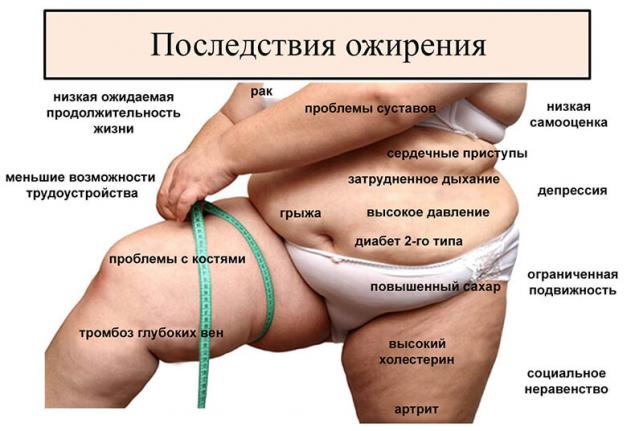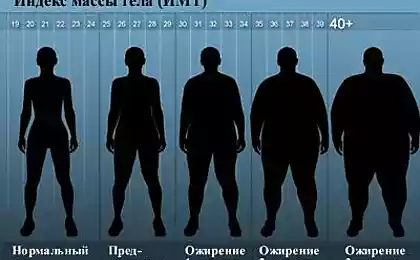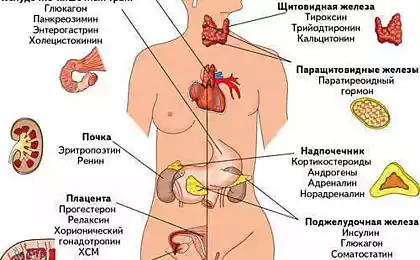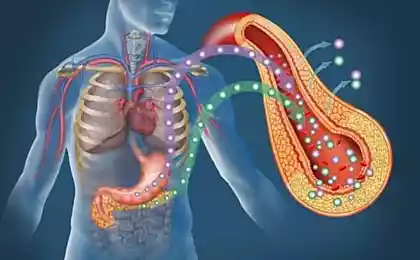597
Causes weight gain
Obesity is a disorder of the homeostasis of energy metabolism. In its origin involves a number of factors, internal and external exchange. They cause significant functional changes in the mental regulation of instinctive behavior in nutrition. Less common cause of obesity are the primary pathological disturbances in secretion of hormones.
Indeed, obesity is often noted during the first year of life (due to the overfeeding of the child), at the beginning of schooling (reduced locomotor activity), before the onset of puberty, between the end of growth (the power remains generally the same, and the energy that was previously used for growth is converted to fat).
Obesity is also noted after a sharp decline in motor activity (in connection with the transition to a sedentary job), when taking hormonal contraceptives, during pregnancy, menopause.
The dynamic phase of obesity is characterized by constant increase in body weight. The condition it can last for decades, and weight gain can be gradual and abrupt.
The reason for the gradual increase of weight is usually in the formation of excessive amounts of energy and lack of its consumption. The sharp increase in weight (e.g. 10 to 15 kg for 1 year) may be a consequence of any disease or sudden decrease of motor activity at the former caloric intake.
After reaching a certain weight, there is a phase of stabilization. While becoming persistent in nature to those hormonal and metabolic disorders that have arisen in the dynamic phase of obesity. They are often considered as an independent disease.
In the phase of stabilization of the fat people eat sometimes even less than those who have normal weight, but despite this, not lose weight. For weight loss, they have to put in considerably more effort than during the dynamic phase of obesity.
Under pressure from the negative stress factors the body produces large amounts of specific hormone, which activates an enzyme that accelerates the process of fat deposition in the abdominal area. Now it is generally recognized that this type of obesity is fraught with the most high risk of diabetes and cardiovascular disorders.
Many scientists believe that in the XXI century, obesity could become a global epidemic. This will pose a serious threat to the health of the planet. But let's not unfounded: pon who data, in economically developed countries of Europe from 45 to 60% of inhabitants have excess weight. In Russia, by the way, in spite of that, today almost 60% of the population has excess body weight.
Modern medicine treats obesity as a chronic disease requiring medical intervention. A unified perspective on obesity does not exist. There are several scientific theories. And rumors and myths are more than enough. For example, many people are convinced that being fat is only a cosmetic flaw, but it's not.
Scientific data indicates that people with excess weight in 3 times more often observed an arterial hypertension and diabetes mellitus, twice as likely – atherosclerosis. Obese have much higher risk of developing cancer, lesions of the blood vessels, joints, gall bladder, and other organs. Obesity dramatically increases mortality.
For example, patients with diabetes with a body mass 25% greater than normal, the probability of premature death is increased 5 times. The Association even made the obesity to the list of major risk factors for heart disease.
And, of course, there are many pseudoscientific theories about the causes of weight gain. Many believe that the whole point of inheritance. But in fact, the reason is that every family has its own food preferences and habits. Of course, children who from an early age, overfed, at maturity, will suffer from excess weight.
That is the most part full of kids and adults just overeat, this is a reflection of a genetic tendency to obesity, without excess food, it would develop into the disease could not. The majority of women believes that the weight inevitably increases during pregnancy, after childbirth and breast-feeding child.
The development of the female body from birth to decay, is divided into periods, which are characterized by certain features: childhood; adolescence (adolescent) period, with the formation of the menstrual function; of the childbearing period pregnancy and lactation; menopausal and post-menopausal. In any of these, the occurrence of obesity is having an extremely adverse effect on women's health.
In order to understand the causes of postpartum obesity, take a short excursion into the physiology.
The center of energy metabolism of the body is the part of the brain called the hypothalamus. The hypothalamus controls energy expenditure via the autonomic nervous system (independent of our consciousness, the part of the nervous system that controls the activity of all internal organs) and hormones.
In addition,the hypothalamus is the main regulator of activity of the reproductive system. It is extremely important for understanding the processes of obesity that in the hypothalamus "the interests" of the endocrine system that controls the function of the reproductive organs and energy metabolism, and autonomic nervous system controlling the functioning of all internal organs, including genital, and endocrine, and the same energy exchange.
When you consider how complicated nature intended, we can understand why obesity and violation of reproductive function in women go hand in hand. Thus, a key role in the regulation of reproductive functions hormones of the hypothalamusthat act on the pituitary gland, and the ultimate goal of the action of these hormones is the production of female sex hormones – estrogens.

In the postpartum period the hypothalamus have not yet managed to break from the extreme control of hormonal and autonomic nervous system of the pregnant woman, but it is assigned a new task – the production of milk.
This increased load may cause failures in the functioning of this part of the brain. Impaired secretion of hormones of the hypothalamus, which in turn affects the amount of fat and the menstrual cycle. To understand this hormonal chaos is difficult.
Experts believe that there is a pRama correlation between the increase of body weight and the severity of dysfunction of the ovaries; most commonly with primary obesity. Therefore, timely correction of body weight often leads to normalization of the menstrual cycle even without applying any special treatment.
There is a misconception that in order to lose weight, it is necessary to limit in the diet of starchy foods, sweets, consume more protein. But our food consists of fats, proteins, carbohydrates, fiber and water. One gram of fat contains 9 calories, 1 gram alcohol – 7 calories, 1 gram of protein is 4 kcal, 1 gram of carbohydrates – 4 kcal.
The main sources of carbohydrates – potatoes, bread, milk, fruit, berries, flour products. Protein is found in lean meat, fish, poultry, cheese, and fats – all kinds of oil, fat, cream, fat meats, or any meat products and cheese.
In water no calories, and therefore, almost no vegetables and greensthat contain a lot of water. A large number of studies and observations of thousands of patients leads to the unequivocal conclusion: the body mass the more food fat. To lose weight, it is not enough to abandon the loaves and sweets, it is necessary to limit yourself in the consumption of meat.
Theories explaining the causes of obesity, a few. So, according to some experts, this is a consequence of improper operation centers of the brain responsible for hunger, appetite or satiety. Other scientists believe that all matter in chronic metabolic disorders, an illness and stress.
The risk of obesity may increase in some periods. So, it easier occurs during the period of increased secretion of hormones that contribute to fat formation, in period conscious of overeating for various reasons and finally, in the period when the person is unable in the circumstances to affect your diet and movement regime.
Factors in the development of obesity are diverse. The most common of them are reduced physical activity, genetic susceptibility, pathology of the endocrine system, overeating.published
From the book "Massage for obesity", A. A. Petrosyan
P. S. And remember, only by changing their consumption — together we change the world! ©
Source: vk.com/wall-23903469?w=wall-23903469_9895
Indeed, obesity is often noted during the first year of life (due to the overfeeding of the child), at the beginning of schooling (reduced locomotor activity), before the onset of puberty, between the end of growth (the power remains generally the same, and the energy that was previously used for growth is converted to fat).
Obesity is also noted after a sharp decline in motor activity (in connection with the transition to a sedentary job), when taking hormonal contraceptives, during pregnancy, menopause.
The dynamic phase of obesity is characterized by constant increase in body weight. The condition it can last for decades, and weight gain can be gradual and abrupt.
The reason for the gradual increase of weight is usually in the formation of excessive amounts of energy and lack of its consumption. The sharp increase in weight (e.g. 10 to 15 kg for 1 year) may be a consequence of any disease or sudden decrease of motor activity at the former caloric intake.
After reaching a certain weight, there is a phase of stabilization. While becoming persistent in nature to those hormonal and metabolic disorders that have arisen in the dynamic phase of obesity. They are often considered as an independent disease.
In the phase of stabilization of the fat people eat sometimes even less than those who have normal weight, but despite this, not lose weight. For weight loss, they have to put in considerably more effort than during the dynamic phase of obesity.
Under pressure from the negative stress factors the body produces large amounts of specific hormone, which activates an enzyme that accelerates the process of fat deposition in the abdominal area. Now it is generally recognized that this type of obesity is fraught with the most high risk of diabetes and cardiovascular disorders.
Many scientists believe that in the XXI century, obesity could become a global epidemic. This will pose a serious threat to the health of the planet. But let's not unfounded: pon who data, in economically developed countries of Europe from 45 to 60% of inhabitants have excess weight. In Russia, by the way, in spite of that, today almost 60% of the population has excess body weight.
Modern medicine treats obesity as a chronic disease requiring medical intervention. A unified perspective on obesity does not exist. There are several scientific theories. And rumors and myths are more than enough. For example, many people are convinced that being fat is only a cosmetic flaw, but it's not.
Scientific data indicates that people with excess weight in 3 times more often observed an arterial hypertension and diabetes mellitus, twice as likely – atherosclerosis. Obese have much higher risk of developing cancer, lesions of the blood vessels, joints, gall bladder, and other organs. Obesity dramatically increases mortality.
For example, patients with diabetes with a body mass 25% greater than normal, the probability of premature death is increased 5 times. The Association even made the obesity to the list of major risk factors for heart disease.
And, of course, there are many pseudoscientific theories about the causes of weight gain. Many believe that the whole point of inheritance. But in fact, the reason is that every family has its own food preferences and habits. Of course, children who from an early age, overfed, at maturity, will suffer from excess weight.
That is the most part full of kids and adults just overeat, this is a reflection of a genetic tendency to obesity, without excess food, it would develop into the disease could not. The majority of women believes that the weight inevitably increases during pregnancy, after childbirth and breast-feeding child.
The development of the female body from birth to decay, is divided into periods, which are characterized by certain features: childhood; adolescence (adolescent) period, with the formation of the menstrual function; of the childbearing period pregnancy and lactation; menopausal and post-menopausal. In any of these, the occurrence of obesity is having an extremely adverse effect on women's health.
In order to understand the causes of postpartum obesity, take a short excursion into the physiology.
The center of energy metabolism of the body is the part of the brain called the hypothalamus. The hypothalamus controls energy expenditure via the autonomic nervous system (independent of our consciousness, the part of the nervous system that controls the activity of all internal organs) and hormones.
In addition,the hypothalamus is the main regulator of activity of the reproductive system. It is extremely important for understanding the processes of obesity that in the hypothalamus "the interests" of the endocrine system that controls the function of the reproductive organs and energy metabolism, and autonomic nervous system controlling the functioning of all internal organs, including genital, and endocrine, and the same energy exchange.
When you consider how complicated nature intended, we can understand why obesity and violation of reproductive function in women go hand in hand. Thus, a key role in the regulation of reproductive functions hormones of the hypothalamusthat act on the pituitary gland, and the ultimate goal of the action of these hormones is the production of female sex hormones – estrogens.

In the postpartum period the hypothalamus have not yet managed to break from the extreme control of hormonal and autonomic nervous system of the pregnant woman, but it is assigned a new task – the production of milk.
This increased load may cause failures in the functioning of this part of the brain. Impaired secretion of hormones of the hypothalamus, which in turn affects the amount of fat and the menstrual cycle. To understand this hormonal chaos is difficult.
Experts believe that there is a pRama correlation between the increase of body weight and the severity of dysfunction of the ovaries; most commonly with primary obesity. Therefore, timely correction of body weight often leads to normalization of the menstrual cycle even without applying any special treatment.
There is a misconception that in order to lose weight, it is necessary to limit in the diet of starchy foods, sweets, consume more protein. But our food consists of fats, proteins, carbohydrates, fiber and water. One gram of fat contains 9 calories, 1 gram alcohol – 7 calories, 1 gram of protein is 4 kcal, 1 gram of carbohydrates – 4 kcal.
The main sources of carbohydrates – potatoes, bread, milk, fruit, berries, flour products. Protein is found in lean meat, fish, poultry, cheese, and fats – all kinds of oil, fat, cream, fat meats, or any meat products and cheese.
In water no calories, and therefore, almost no vegetables and greensthat contain a lot of water. A large number of studies and observations of thousands of patients leads to the unequivocal conclusion: the body mass the more food fat. To lose weight, it is not enough to abandon the loaves and sweets, it is necessary to limit yourself in the consumption of meat.
Theories explaining the causes of obesity, a few. So, according to some experts, this is a consequence of improper operation centers of the brain responsible for hunger, appetite or satiety. Other scientists believe that all matter in chronic metabolic disorders, an illness and stress.
The risk of obesity may increase in some periods. So, it easier occurs during the period of increased secretion of hormones that contribute to fat formation, in period conscious of overeating for various reasons and finally, in the period when the person is unable in the circumstances to affect your diet and movement regime.
Factors in the development of obesity are diverse. The most common of them are reduced physical activity, genetic susceptibility, pathology of the endocrine system, overeating.published
From the book "Massage for obesity", A. A. Petrosyan
P. S. And remember, only by changing their consumption — together we change the world! ©
Source: vk.com/wall-23903469?w=wall-23903469_9895























